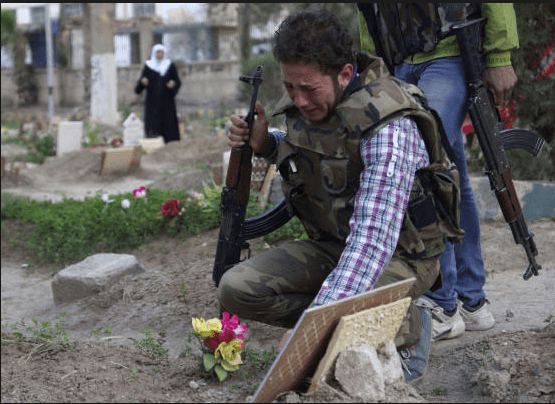This post is also available in:
![]() العربية
العربية
Six months ago, I was sitting watching my city bleeding, the Euphrates was the separation between her and me like a father who prevents me from being harmed. I was sitting on its banks and watching Deir Ezzor suffer. It witnessed intense shelling and bombardment for six months. These months were a watershed in the history of the city, as an army consisting of the locals of Deir Ezzor was formed at the time, aiming to overcome slavery and humiliation that had befallen on the city by resisting and countering the sectarian army of the Assad-regime and its heinous, wicked aims.
It was a real, bloody war; the war waged by the oppressive regime on the city of Deir Ezzor, during which he made use of his entire military arsenal in the region, tanks shelling the neighborhoods, artillery pounding our homes while his warplanes conducting air raids and dropping their flaming bombs on the residential buildings and streets.
Fierce and historic epic battles took place on the streets of the city, with the FSA battalions setting an unsurpassed example of sacrifices, bravery and heroism, which, to the very moment, remain memorable in the mind of its sons. The FSA experienced a lack of manpower though, as it was only made up of a dozens of oppressed youth by the tyrannical regime, who understood that war against the regime was a matter of either death or life.
Most of the youth who were part of the revolution in Deir Ezzor, had left the city for many reasons. Some were not fully convinced with the idea of taking up arms, while a group of them believed that it would be just a matter of days before returning to the previous situation once again, while the last portion had to leave the city as their loved ones were in a critical need of help. They left Deir Ezzor but left their souls attached to their beloved city of Deir Ezzor and their hearts and wishes with their friends who preferred to stay protecting it.
We counted on some friends who were in charge of posting the updates on the situation in Deir Ezzor. The students, doctors and teachers all chose to fight after realizing being in the same trench; the trench of our timeless dream, which was translated into reality; the trench of freedom.
Mohammed H, a young man in his twenties, with whom I spent several years in the same neighborhood. The laugh was Mohammed life address; he was with the vanguard of young demonstrator. He would film the demonstrations, and upload them to social media. He did not slept at his home for most of the time, as he was wanted by many of the security branches in the city. He was considered a big terrorist in their eyes and big hero in our eyes. Mohamed conveyed the truth via the internet. Every week the regime security branches would conduct raids on his home, hoping that they might arrest him to get rid of one of the voices that called for freedom.
He experienced an extreme hardship for around six months, during which he was away and disconnected from all his relatives, families and friends. During the beginning of the military operations in Deir Ezzor, Mohamed was among the first to join. He was among the distinguished, brave heroes who remained in the city, having in mind nothing but to defeat oppressive Assad forces.
For multiple times, I would contact him to keep me updated with the situation of my city, which was held as a hostage. Mohamed was no longer the laughing 20-years-old person; he became older than his age, analyzing issues that surpassed his age. As battles intensified in the city, we lost contact with Mohamed. I kept following the news from the banks of the Euphrates River. Due to certain circumstances, my family and I had to move to a safer place in the village of Hatlah overlooking the Euphrates, where I could watch smoke rising up from the buildings due to the clashes that were taking place in the city.
My phone rang, and it was one of the friends who were on the battlefield, telling me “we’ve liberated two lanes in Al-Oradi neighborhood, our joy is indescribable, God is great, but many of our brothers and sisters rose as martyrs.”
“Mohammed H. is among the martyrs.”
Silence dominated that moment. I could not accept the idea of Mohamed rising as a martyr, as we were not used to news of death at the time. The report was confirmed and reliable. It took me several days to adapt to the idea of losing one of the most honest people I have ever known. With the fall of every martyr, another group of fighters would enter the city to reinforce their besieged comrades. Closing off all the entrances to the city was not an excuse to divert them from their aims. They found out new ways and used crossed the Euphrates rivers and entered the city from the villages near it. Days after day, the FSA was developing and reorganizing its ranks until it become an effective force and gained a strength to counter the Assad army with its mighty military arsenal.










